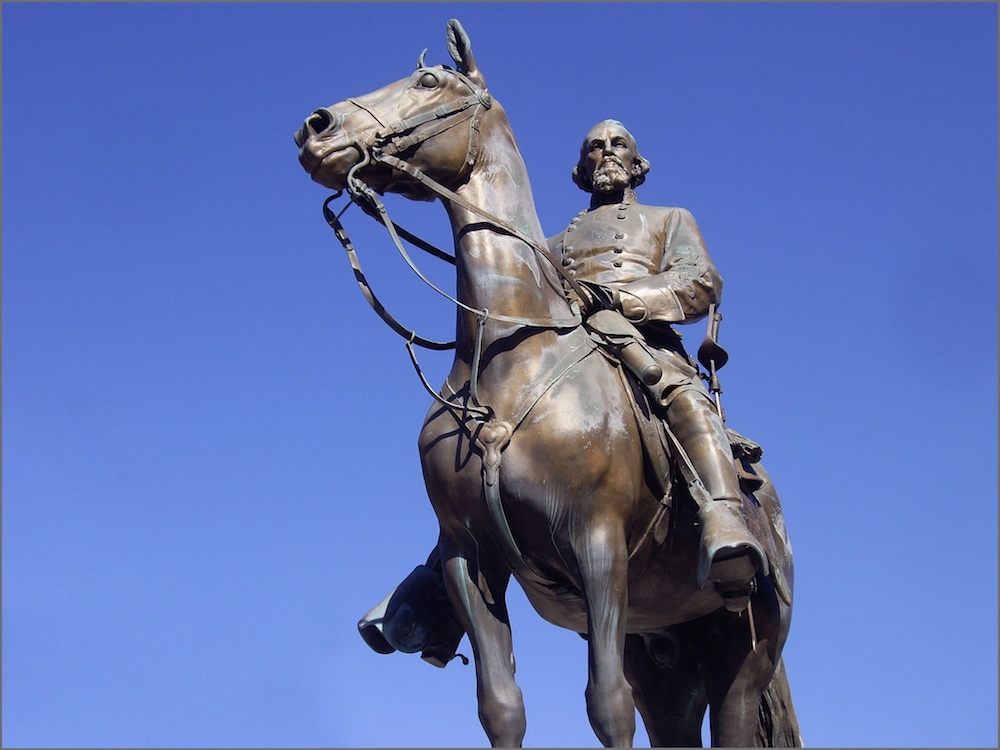Reckoning with Confederate monuments in 2018

Memphis, Tennessee, removed this statute of Nathan Bedford Forrest, a Confederate general and early KKK leader, from a city park recently using a creative approach to get around state law. (Photo by Ron Cogswell via Flickr.)
Back in August, two days after Heather Heyer was killed in a white supremacist terror attack in Charlottesville, Virginia, activists in Durham, North Carolina, pulled down a statue of an unnamed Confederate soldier that had stood outside the Durham County Courthouse since 1924. Durham County District Attorney Roger Echols filed felony charges against eight protesters in November but lowered those charges to misdemeanors earlier this month
The actions in Durham and in other cities around the country such as New Orleans have forced states and municipalities around the country to reckon with these monuments to the Confederacy, the Lost Cause, and Jim Crow — and this year is shaping up to bring more changes.
According to 2016 numbers from the Southern Poverty Law Center, there were 629 Confederate monuments in the 11 states that seceded from the Union, including 96 in Virginia and 90 each in Georgia and North Carolina. There were another 41 in Kentucky and 17 even in West Virginia, a state that owes its very existence to its residents' rejecting secession. The vast majority of these monuments were put up not in the immediate aftermath of the Civil War but during the first half of the 20th century, at the height of Jim Crow segregation.
But in seven Southern states, removing Confederate monuments from public spaces is complicated by laws that make it difficult or ban it altogether. Georgia and Virginia passed such laws in the early 20th century, while Mississippi and South Carolina did so in the early 21st. Alabama, North Carolina, and Tennessee have followed suit in the past three years.
Under North Carolina's law, the memorial in Durham couldn't have come down even if local officials had wanted it to. Passed by the Republican-controlled legislature in 2015 and signed by then-Gov. Pat McCrory (R) after a Confederate statue in Chapel Hill was vandalized, the law bans the state and local governments from moving "objects of remembrance" — including Confederate statues and monuments — without the approval of the North Carolina Historical Commission.
Responding to the Durham monument takedown, Gov. Roy Cooper (D) called for the legislature to repeal the law. Then in September, he petitioned the Historical Commission to relocate three statues from the state Capitol grounds in Raleigh to a Civil War battlefield in nearby Johnston County. The commission, whose members are appointed by the governor to staggered terms, postponed a decision that month but created a committee to study the issue.
In January, that committee decided to seek outside advice from a Civil War museum in Fayetteville, North Carolina. It also decided to hold at least one public hearing about relocating the monuments. UNC professor W. Fitzhugh Brundage told the Daily Tar Heel that this is only the beginning of what could be a long process.
"If the historical commission does say that the monuments should be removed, there's immediately going to be a legal challenge," he said. "I would think there would be years of legal haggling in that case."
A creative approach in Memphis
In Georgia, meanwhile, two Atlanta-area state legislators are aiming to repeal the state's restrictions on monument relocation and removal entirely.
Passed in the early 20th century, Georgia's law was updated in 2001 as part of a compromise to remove Confederate imagery from the state flag. It forbids publicly owned monuments honoring military service to either the United States or the Confederacy to be "relocated, removed, concealed, obscured, or altered in any fashion."
After Charlottesville, there was a renewed push to change Georgia's law as local governments wrestled with the fate of monuments. Among them was Decatur in DeKalb County, where city leaders voted in October to take down a monument. Then in January, the majority-black DeKalb County Commission voted 6-1 to relocate the monument from its current location. The resolution also called for the full repeal of the anti-removal law.
The DeKalb commissioners got the attention of legislators: State Sen. Elena Parent and Rep. Mary Oliver, Democrats who represent the county, filed identical bills to change the law to give control of the monuments to local governments. But with Republicans in control of the Georgia legislature, Oliver told constituents that she doubted her bill would be voted on in this session.
In Tennessee, meanwhile, there's been a unique effort to get Confederate monuments out of public spaces in one city.
That state has a law like North Carolina's requiring approval from the historical commission to relocate statues. So when Memphis sought to relocate from public parks statues honoring Confederate general and Ku Klux Klan leader Nathan Bedford Forrest and Confederate President Jefferson Davis, city attorney Bruce McMullen came up with a creative approach: Take the lands on which the statues were erected out of the public realm.
On Dec. 20, the city sold the two parks for a total of $2,000 to Memphis Greenspace, a nonprofit run by county commissioner Van Turner. The statues were removed that night. Although Tennessee Republicans and Confederate groups were outraged, McMullen maintains that the move was within the law.
"I was in charge of getting these statues down legally," he told Slate, "and I was going to look at every legal method to do it."
Tags
Paul Blest
Paul Blest is a contributing writer for Facing South. He is also a contributing writer for the Outline and has written for The Nation and Current Affairs. He lives in Raleigh, North Carolina.
